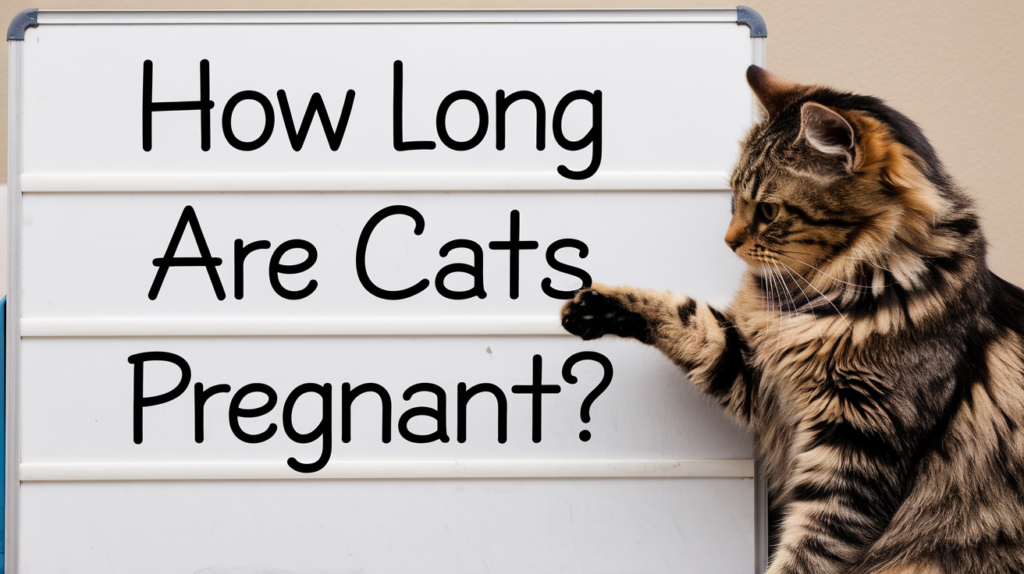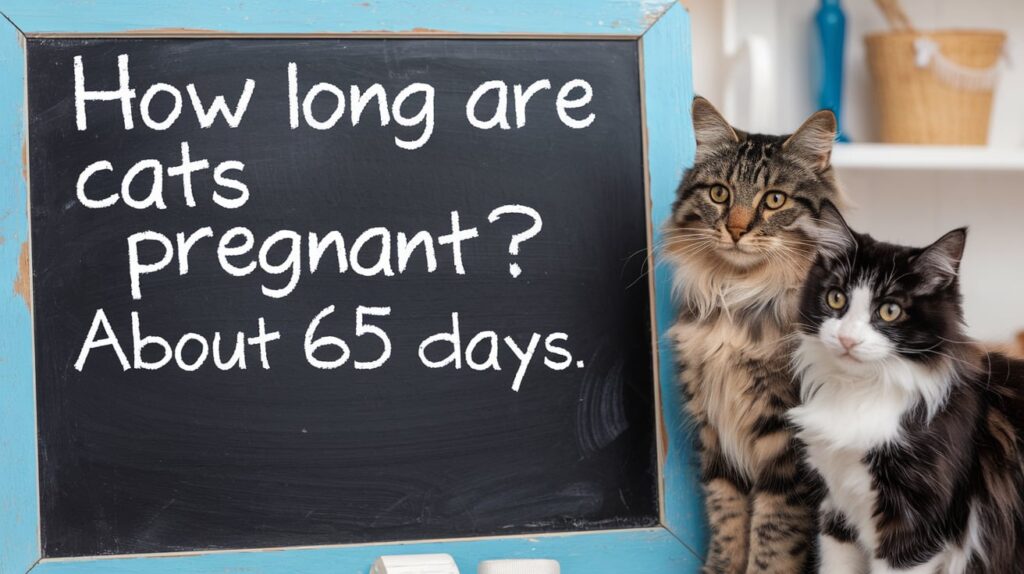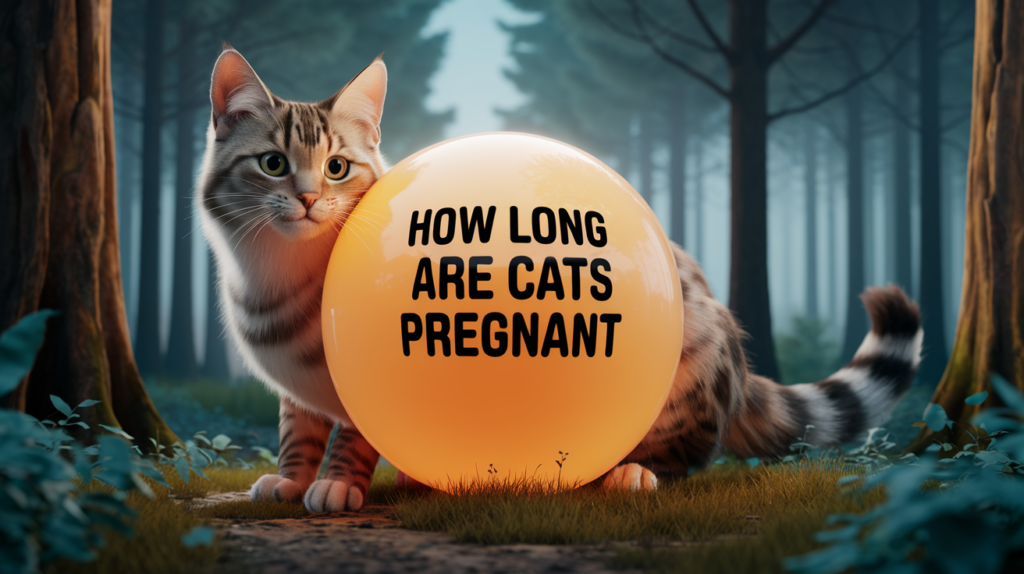How Long Are Cats Pregnant?
When you find out that your cat is expecting kittens, the excitement of anticipating new arrivals is bound to fill your home. Understanding the timeline of your cat’s pregnancy is crucial for ensuring the mother and her kittens stay healthy throughout the process. So, How long are cats pregnant? Let’s delve into everything you need about the feline pregnancy timeline, from conception to birth.
The Typical Duration of a Cat’s Pregnancy
How long are cats pregnant? The average gestation period for cats typically lasts between 63 to 67 days or about nine weeks. However, this period can vary slightly depending on several factors, including the cat’s breed, age, and overall health. Some cats may give birth as early as 58 days, while others may carry their kittens for up to 72 days. It’s important to monitor your cat closely and consult with your veterinarian to ensure everything is progressing smoothly.

The Stages of Feline Pregnancy
To better understand How long are cats pregnant? it’s helpful to break down the pregnancy into three key stages: early pregnancy, mid-pregnancy, and late pregnancy. Each stage is marked by distinct changes in the cat’s body and behavior.
Early Pregnancy (Weeks 1-3)
In the early stages of pregnancy, it may be difficult to notice what your cat is expecting. During the first three weeks, fertilization occurs, and the embryos begin to develop within the uterus. Your cat might experience some mild symptoms such as:
- Morning sickness: Just like in humans, cats can experience nausea or vomiting during early pregnancy. This usually goes away after a few days.
- Increased appetite: As the pregnancy progresses, your cat’s appetite may increase, signaling the need for more nutrients to support the growing kittens.
At this stage, your veterinarian can confirm the pregnancy through an ultrasound, usually around the 15th to 18th day.
Mid-Pregnancy (Weeks 4-6)
By the fourth week, the pregnancy becomes more apparent. The kittens continue to grow, and you may notice some physical and behavioral changes in your cat:
- Visible weight gain: Your cat’s abdomen will begin to swell as the kittens grow. This is a clear sign that she is well into her pregnancy.
- Nipple enlargement and color change: The nipples may become more prominent and develop a pinkish hue, a condition known as “pinking up.”
- Behavioral changes: Your cat might become more affectionate and seek more attention or, conversely, become more withdrawn and seek solitude.
During this time, it’s important to provide your cat with a nutritious diet that supports her increased nutritional needs. Speak with your veterinarian about the best food options for pregnant cats.
Late Pregnancy (Weeks 7-9)

In the final weeks, your cat will prepare for the birth of her kittens. During this stage, you’ll notice the following signs:
- Nesting behavior: Your cat will begin to seek out a quiet, comfortable place to give birth. She might begin collecting soft things like blankets or towels to make a nest.
- Increased restlessness: As the due date approaches, your cat may appear restless and have difficulty finding a comfortable position to rest.
- Decreased appetite: In the last days of pregnancy, your cat’s appetite may decrease as the kittens take up more space in her abdomen.
Knowing how long are cats pregnant helps in preparing for this final stage. Make sure to provide a safe and quiet area where your cat can give birth without disturbances.
What Affects the Length of a Cat’s Pregnancy?
While the typical gestation period for cats is around nine weeks, various factors can influence How long are cats pregnant. Understanding these factors can help you better anticipate the timing of your cat’s delivery.
Breed
Some cat breeds may have slightly different gestation periods. For instance, Siamese cats are known to have longer pregnancies, sometimes lasting up to 72 days. On the other hand, smaller or mixed-breed cats might give birth earlier than the average gestation period.
Age and Health
A cat’s age and overall health can also affect the length of her pregnancy. Younger cats or first-time mothers might have shorter pregnancies, while older cats or those with health issues could experience longer gestation periods. Regular veterinary check-ups are essential to monitor the health of both the mother and the kittens throughout the pregnancy.
Litter Size
The number of kittens your cat is carrying has an impact. Cats carrying larger litters may give birth slightly earlier, while those with only one or two kittens may carry them to full term or even longer. Ultrasounds and X-rays performed by your veterinarian can give you an idea of how many kittens to expect and help predict the delivery date.

Signs That Labor Is Approaching
As the end of the gestation period nears, knowing the signs of impending labor can help you prepare for the arrival of the kittens. Here are some indicators that your cat is about to give birth:
- Temperature drop: A cat’s normal body temperature ranges from 100.4°F to 102.5°F (38°C to 39.2°C). About 24 hours before labor begins, her temperature may drop to around 99°F (37.2°C).
- Milk production: Your cat’s mammary glands may start to produce milk a day or two before labor begins.
- Vocalization and restlessness: Your cat may become more vocal and restless as she experiences contractions.
- Licking and grooming: Increased licking of the genital area is a sign that labor is imminent.
What to Do When Your Cat Goes Into Labor
Once you recognize the signs of labor, it’s important to remain calm and provide a supportive environment for your cat. Here’s what you can do:
- Prepare a nesting area: Ensure that your cat has access to the nesting area she has chosen. This area should be quiet, warm, and free from disturbances.
- Monitor the process: While it’s natural to want to assist, it’s usually best to let your cat handle the birth on her own. However, keep an eye on her in case any complications arise.
- Contact your veterinarian: If your cat experiences prolonged labor or excessive bleeding, or if more than two hours pass between the births of kittens, contact your veterinarian immediately.
Caring for Your Cat Post-Birth
After the kittens are born, your cat will require special care to ensure a smooth recovery and to help her care for her new litter. Understanding is just the first step in ensuring the health and well-being of both mother and kittens.
Immediate Care
In the first few hours after giving birth, your cat will be focused on cleaning her kittens and encouraging them to nurse. Make sure she has access to fresh water, food, and a clean litter box nearby. Monitor the kittens to ensure they are nursing properly and staying warm.
Postnatal Check-up
Schedule a postnatal check-up with your veterinarian within 24 to 48 hours after birth. This visit is crucial to ensure that your cat is recovering well and that the kittens are healthy. The veterinarian can also provide advice on caring for the newborns and address any concerns you may have.

Nutrition and Hydration
A nursing cat requires a diet rich in calories, protein, and nutrients to support milk production. Continue feeding her high-quality kitten food or a diet recommended by your veterinarian. Ensure she stays hydrated by providing fresh water at all times.
Conclusion
Understanding How long are cats pregnant? is essential for providing the best care for your cat during her pregnancy. With a typical gestation period of 63 to 67 days, cats go through distinct stages that require specific attention and care. By being aware of the signs of labor and knowing what to do when the time comes, you can help ensure a safe and smooth birthing process for your cat and her kittens. Remember to consult your veterinarian regularly and provide your cat with a comfortable, stress-free environment to give her the best chance at a healthy pregnancy and delivery.
FAQs: How long are cats pregnant?
- How many months is a cat pregnant for?
A cat is pregnant for about 2 months, typically between 63 to 67 days. - How can you tell how far along a cat is?
You can tell how far along a cat is by observing physical changes like nipple enlargement, weight gain, and behavioral changes. A vet can provide a more accurate estimate through an ultrasound or palpation. - How soon do cats show signs of pregnancy?
Cats usually start showing signs of pregnancy around 2 to 3 weeks after conception, such as increased appetite, “pinking up” of the nipples, and slight weight gain. - How many kittens will my cat have for the first time?
First-time mothers typically have smaller litters, usually ranging from 2 to 5 kittens. However, the number can vary depending on the cat’s breed, age, and health.

Welcome to Hypocats.com! I’m Khawar Akhtar, a passionate writer dedicated to all things feline. With a deep love for cats and a keen interest in their health, diet, and training, I strive to provide cat owners with valuable insights and practical advice to enhance their furry friends’ well-being. My goal is to share my expertise and enthusiasm for our whiskered companions, helping them lead happier, healthier lives. When I’m not writing, you’ll find me spending quality time with my Russian Blue cat, enjoying the simple joys that come with being a cat lover. Thank you for visiting Hypocats.com—I hope you find the information here as helpful and inspiring as I do!


Leave a Reply